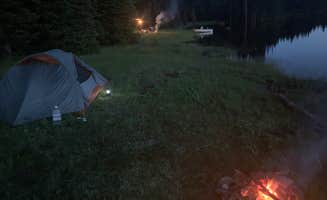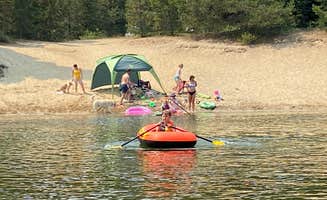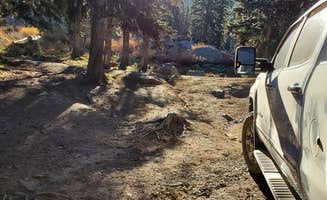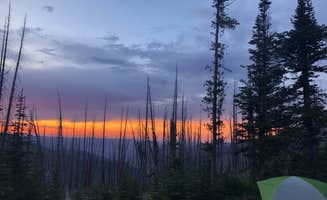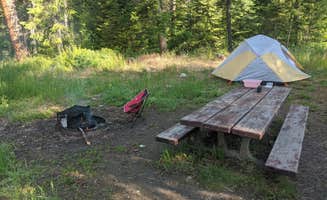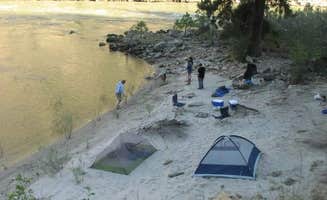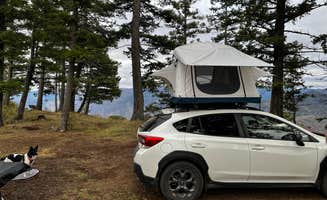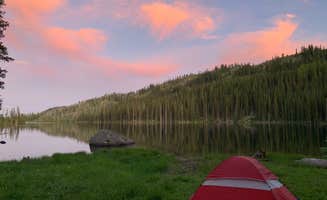Dispersed tent camping around New Meadows offers varied backcountry experiences in the Payette National Forest at elevations ranging from 3,800 to 7,000 feet. The region features multiple alpine lakes with primitive camping options accessible via forest service roads. Temperature swings between day and night can exceed 40 degrees even during summer months, requiring proper gear regardless of season.
What to do
Mountain biking access: Brundage Reservoir serves as an excellent base camp for mountain biking enthusiasts. A camper noted, "We went here for mountain biking (if you go, check out Groupon for the lift) this campground was awesome because it was so close to Brundage resort, and the ski lift up."
Hiking to alpine lakes: Paddy Flat - Jughandle Mountain Area offers direct trail access to pristine mountain lakes. "Very short hike nice camping. A very cold lake bring water or filter," mentions one visitor who appreciated the accessible terrain.
Fishing opportunities: Fishing is popular at many New Meadows tent sites, particularly at Seven Devils Campground where alpine lakes contain native trout. A visitor reports, "There are several hikes that can be done in a single day or stretched out to multi day trips that go along mountaintops and alpine lakes."
What campers like
Lakeside camping: Brundage Reservoir Camping Area provides direct water access for paddling and swimming. One camper described their experience: "We then spotted a beautiful lake through the trees. Both of us, as well as our pup, were amazed as we made our way through some brush, at which point we saw an open spot right next to the water."
Wildlife viewing: The New Meadows backcountry hosts diverse wildlife including eagles, moose and mountain goats. At Northwest Passage Campground, a camper reported, "The wild life there is abundant. We saw bald eagles, moose, deer and chipmunks."
True solitude: The remoteness provides genuine disconnection. A visitor at Rapid Creek Camping Area shared, "All in all, Rapid Creek dispersed camping is excellent if you just want a quiet place where no one is around. It's amazing but not for the reasons people usually like in my opinion."
What you should know
Road conditions: Most dispersed sites require navigating unmaintained forest roads. Seven Devils Campground requires "45 minutes drive on dirt road" according to one camper, while another notes the need to "take your time driving up 17 Mile road (takes about an hour to get here from Riggins!)."
Limited facilities: Vault toilets are available at some sites, but most have no amenities. At Lick Creek Area, you'll find "3 spots. One large one with stock holding. A CTX toilet and fire rings," according to a visitor.
Cold water sources: Lakes and streams near New Meadows remain cold year-round, often requiring filtration. A camper at Granite Lake Camping Area emphasized it's an "awesome place for rent camping and hiking lots of trails to explore but not a great place if you need a RV to go camping."
Tips for camping with families
Best family-friendly sites: Northwest Passage Campground offers accessible river recreation ideal for children. A family camper shared, "There is a beach area for the campers that is perfect for kids to play and to relax and watch for floaters."
Insect preparation: Mosquitoes can be problematic during summer months. One experienced camper advised, "One downfall here is the amount of mosquitoes. They are large and thirsty. We came prepared this year with lots of mosquito spray and some thermoscell mosquito deterrent. It helped immensely."
Wildlife safety: Rapid Creek Camping Area requires proper food storage due to wildlife. "I never saw any bear scat but signs on the property warn of them so be smart with your food," noted one camper who visited in August.
Tips from RVers
Size limitations: Most dispersed sites can only accommodate smaller rigs or trailers. At Northwest Passage, "Some of the spots are big enough for trailers. Some are small and cozy for tent campers," according to a recent visitor.
Water planning: No potable water exists at most sites, requiring self-sufficiency. A Northwest Passage camper explained, "There is a water pump at the entrance of the camp site that you get your water from. There are no hook ups or running water at sites."
Cost considerations: While most dispersed camping is free, established campgrounds may charge fees, especially for out-of-state visitors. One camper noted their Northwest Passage experience as "62$. No hooks. No cell. Because I'm out of state."


